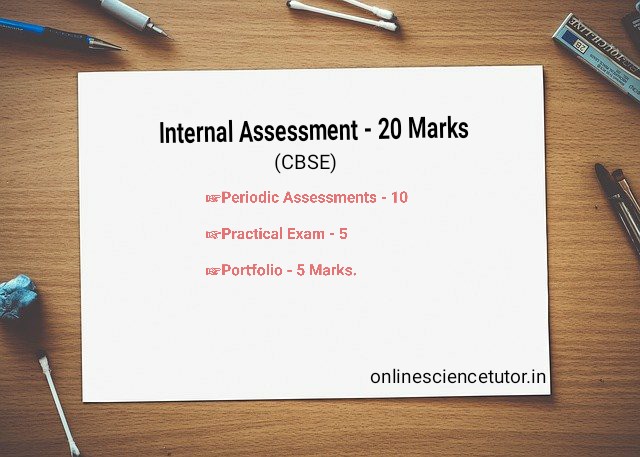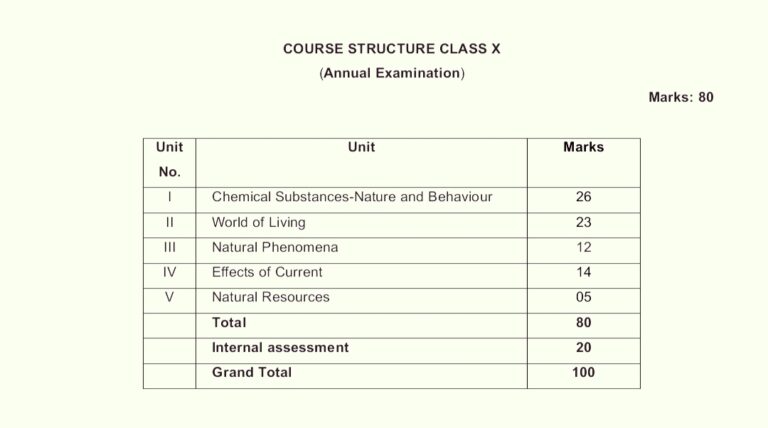How to get Full Marks in 10th Board Exam from Internal Assessment
How are internal marks calculated in CBSE 10? The science paper board exam 2024 consists of 100 marks. Eighty numbers are found by annual examination. Students receive the remaining 20 numbers through internal Assessment.
How are internal marks calculated in cbse 10? The science paper board exam 2024 consists of 100 marks. Eighty numbers are found by annual examination. Students receive the remaining 20 numbers through internal Assessment.
The main topic of this article is how to find 20 numbers 20 in the internal examination in the board exam. To get the whole number, you have to understand simple mathematics.
The syllabus of internal Assessment is divided into three sections. There are 10 numbers of periodic assessments. Practical marks 5 & the remaining five numbers belong to Portfolio.
Let us first see the syllabus in the guidelines issued in 2024 by CBSE. Only then will we be able to make the correct analysis?
CBSE class 10 internal marks distribution
Internal Assessment 20 Marks divided into 3 categories, namely :
- Periodic Assessment – 05 marks – 05 marks
- Subject Enrichment (Practical Work) – 05 marks
- Portfolio – 05 marks.
What is Periodic Assessment? The school occasionally conducts periodic exams, like unit tests, half-yearly & pre-board for us. Not only this, but many also organize festivals like quizzes and presentations. Based on these activities, how many of the 10 numbers we will get is decided.
Periodic Assessment is also divided into two sections –
For 5 marks – Periodic Tests
The school conducted three periodic tests. Average of the best two tests to be taken that will have a weightage of 05 marks towards the final result.
For 5 marks – Dynamics and Curriculum Transaction
Diverse Assessment methods per the need of the class dynamics and curriculum transaction.
These may include – short tests, oral tests, quizzes, concept maps, projects, posters, presentations and enquiry-based scientific investigations etc., and use rubrics to argue them objectively. This will also have a weightage of 05 marks towards the final result.
- What is Subject Enrichment (Practical Work)?
Practical / Laboratory work should be done throughout the year, and the student should maintain a record of the same. Practical Assessment should be continuous. There will be a weightage of 5 marks towards the final result. All practicals listed in the syllabus must be completed.
- What is Portfolio in Internal Assessment
This would include classwork and another sample of student work and will carry a weightage of 5 marks towards the final results.
Will the School give full Internal marks?
As the school year ends, students are eager to know whether they will receive full internal marks. Although some schools have already decided to give full marks, others still need to decide.
There are many factors that schools must consider before making a decision. One of the most important factors is whether students have been able to complete all of their work. If students cannot complete all of their work, it would not be fair to give them full marks.
Another factor that schools must consider is how well students have done throughout the year. If students have worked hard and shown improvement, they may be more likely to receive full internal marks.
Ultimately, it is up to each school to decide whether or not they will give full internal marks. Students should continue to work hard and check with their school for updates on this decision.
Do teachers give full marks in internals class 12?
Teachers play a significant role in our lives. They help us learn and grow. But do they always give us full marks in internals class 12?
Some students feel teachers are more lenient when giving full marks in internal class 12. This may be because the teachers want their students to succeed and pass their exams.
However, some students feel teachers are more strict when giving full marks in internal class 12. This may be because the teachers want their students to learn and not just get good grades.
Whatever the reason, it is up to the teacher to decide whether or not they want to give their student full marks in internals class 12.
How are internal marks calculated in cbse 10?
CBSE 10 students are given a total of 20% internal marks. These internal marks are given based on their performance in 3 subjects, each contributing 10% to the final score.
The first internal Assessment is based on the student’s classwork and homework over some time. The second internal Assessment is based on the student’s tests and exams. The third internal Assessment is based on the student’s project work.
What are internal marks in the 10th class?
In India, the 10th class is a significant milestone in a student’s educational journey. The 10th class is the last year of high school, and the marks scored in this year’s exams are significant for getting into a good college.
Most colleges in India consider the marks scored in the 10th-class exams as one of the primary criteria for admission. The 10th class is considered the foundation year for higher studies.
The marks scored in this year’s exams indicate the student’s academic potential and ability to cope with higher studies.
The teachers of each subject give internal marks in the 10th class, and they play a significant role in determining the final grades.
Do teachers give full marks in internals class 12?
There are many reasons why teachers may give full marks in internals for Class 12 students. One reason may be that the student has performed exceptionally well and deserves full marks.
Another reason may be that the teacher is lenient and gives full marks to all students. There are also instances where teachers have been known to give full marks to students who have bribed them.
Conclusion Points
Twenty internal Assessment marks are in the hands of the Hundred Percent School. The school can give you as much as you like. Your behaviour is the most significant factor in this. If your behaviour is excellent, then it can benefit you very much.
The second most significant factor is how many marks come in your school exam. At the right time, you submit the assignment given by the school; this is the third most significant factor, according to me.
If you complete your academic year keeping all these things in mind, you will get full marks.
FAQs
Question – Is internal marks added in class 10 percentage?
Answer: Internal marks are included in the overall percentage of class 10 students.
Question – How are internal marks calculated in CBSE?
Answer: Internal marks in CBSE are usually based on tests, assignments, projects, and class participation.
Question – Do internal marks matter in class 10?
Answer: Internal marks play a significant role in determining a student’s final grades and percentage in class 10.
Question – What is the importance of internal assessment in CBSE?
Answer: Internal assessment helps evaluate students’ understanding and performance throughout the academic year, providing a more holistic view of their capabilities.
Question – Are there specific guidelines for calculating internal marks in CBSE?
Answer: CBSE provides schools guidelines regarding the weightage assigned to different components when calculating internal marks.
Question – Can students appeal against their internal assessment scores?
Answer: If a student believes that their internal assessment scores have been unfairly evaluated, they can appeal to their school administration or board authorities for re-evaluation.
Question – Do all subjects have the same weightage for internal assessment?
Answer: No, each subject may have different weightage criteria for internal assessment as per CBSE guidelines.
Question – Are external exam results solely based on internal marks?
Answer: No, external exam results also contribute significantly to the final grades and overall percentage obtained by students in class 10 examinations.
Question – What are the key factors to consider to get full marks in the 10th CBSE Board Exam?
Answer: Start your preparation early, follow a proper study schedule, understand the exam pattern and marking scheme, practice previous years’ question papers, revise regularly, seek help from teachers or tutors when needed, and stay focused and confident during the exam.
Question – How can I effectively manage my time while preparing for the 10th CBSE Board Exam?
Answer: Create a study timetable that allocates sufficient time to each subject, prioritize topics based on their weightage in the exam, avoid procrastination and distractions, take short breaks between study sessions to refresh your mind, and regularly evaluate your progress to make necessary adjustments.
Question – Are NCERT textbooks enough for scoring full marks in the 10th CBSE Board Exam?
Answer: NCERT textbooks provide comprehensive syllabus coverage and serve as the primary resource for board exams. However, you can also refer to additional reference books or online resources to better understand concepts or solve practice questions.
Question – How important is practising sample papers for achieving full marks in the 10th CBSE Board Exam?
Answer: Practicing sample papers is crucial as it helps you familiarize yourself with the exam pattern and question formats. It also improves your time management skills and enhances your problem-solving abilities by exposing you to various questions that may appear in the exam.
Question – Is it necessary to memorize all textbook content to score full marks in the 10th CBSE Board Exam?
Answer: While understanding concepts is more important than rote memorization, some specific facts or formulae should be memorized. Focus on comprehending topics thoroughly and use mnemonics or other memory techniques when required.
Question – How can I improve my writing skills to secure maximum English or Social Science marks?
Answer:
- Read extensively from different sources to enhance vocabulary and grammar skills.
- Practice writing essays, letters, and comprehension passages regularly.
- Seek feedback from teachers or peers to identify areas of improvement and work on them.
Question – How should I approach the numerical-based questions in subjects like Mathematics and Science?
Answer: Understand the concepts thoroughly, practice solving numerical problems regularly, and learn different problem-solving techniques. Break down complex problems into smaller steps for better clarity and always show the complete solution with proper explanations.
Question – How can I stay calm and confident during the 10th CBSE Board Exam to perform at my best?
Answer: Develop a positive mindset by adopting stress management techniques such as deep breathing exercises, meditation, or yoga. Take care of your health through regular exercise, adequate sleep, and a balanced diet. Believe in your preparation and focus on giving your best without worrying about the outcome.
You Should Check




